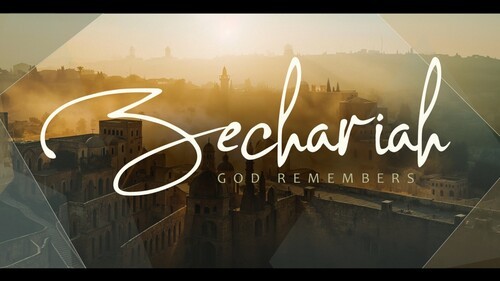Zechariah 1:7–21 — Visions 1 and 2

Zechariah 1:7–21 — Visions 1 and 2
The ministry of the prophet Zechariah coincided with the ministry of the prophet Haggai. Both were calling the people to rebuild the temple. However, while the prophet Haggai focused on the outward task of rebuilding the temple, the prophet Zechariah focused on the inward task of rebuilding the remnant spiritually. While the book of Haggai centers primarily around the immediate local matter at hand, the book of Zechariah has an eschatological outlook.
The Purpose of Zechariah's Ministry
Zechariah's immediate concern was to rebuke the people for their delay and to encourage them to rebuild the temple (4:8-10). He does this by giving the people a message of hope that their wait for the fulfillment of God's promises is not in vain. Threatened by the surrounding nations, the fear in God's people created a crisis of faith about whether God will bring back His blessings as promised in Deuteronomy 30. To accomplish his purpose, Zechariah affirms the nation's continued covenant with God and paints a picture of the inauguration of the Messianic kingdom. The eight visions in 1:7–6:8 assure the people that if they return to the Lord, He will return to them (1:3).
The Horseman Among the Myrtle Trees (1:7-17)
In the first vision, Zechariah sees a Man riding a red horse among myrtle trees. Behind Him are other horses—red, sorrel (brown), and white. The Man on the red horse is later refered to as "the Angel of the Lord", a common reference in the Old Testament to the preincarnate Christ. An angel who was helping Zechariah understand the vision, let's those in the vision answer Zechariah as to the meaning of this. The Angel of the Lord says that the other horsemen are those who had traveled throughout the earth. These horsemen answer the Angel of the Lord that the earth is at peace. In response, the Angel of the Lord then intercedes for Jerusalem and Judah. God then affirms His love for Israel through the angel that is guiding Zechariah. The Angel then tells Zechariah to proclaim God's promise of restoration.
The message of this vision is that repentance is essential. The people must turn back to God and trust in His promises. Nevertheless, God’s love endures, and He is committed to restoring His people. The vision also points to the ultimate High Priest—the coming Messiah. He is the Angel of the Lord (the preincarnate Christ) who intercedes on behalf of God's people.
The Four Horns and Four Craftsmen (1:18-21)
In the second vision, Zechariah witnesses four horns, symbolizing powerful nations that have oppressed "Judah, Israel, and Jerusalem” (1:19). These four horns represent the Gentile powers who oppressed God's people: Assyria, Egypt, Babylon, and Medo-Persia. Alongside the horns, Zechariah sees four craftsmen. These craftsmen are coming to “cast out the horns,” signifying God’s intervention to defeat Israel’s enemies. The vision emphasizes God’s judgment on the nations that afflicted His chosen people and the restoration of Israel and Jerusalem
Application
These visions serve as a powerful reminder of God’s faithfulness, His plans for Israel, and the eventual downfall of oppressive forces. You may feel forgotten or discouraged, like the struggling remnant in post-exilic Jerusalem, but you can find encouragement in Christ because of:
1. His Powerful Presence: Just as the Angel of the Lord (the preincarnate Christ) interceded for Jerusalem, Christ intercedes for us now (Hebrews 7:25).
2. His Prayer for Us: Jesus prayed for our welfare (John 17:20–26).
3. His Promises: God is always faithful to His promises. His promises assure us of a glorious future (Jeremiah 29:11).
The ministry of the prophet Zechariah coincided with the ministry of the prophet Haggai. Both were calling the people to rebuild the temple. However, while the prophet Haggai focused on the outward task of rebuilding the temple, the prophet Zechariah focused on the inward task of rebuilding the remnant spiritually. While the book of Haggai centers primarily around the immediate local matter at hand, the book of Zechariah has an eschatological outlook.
The Purpose of Zechariah's Ministry
Zechariah's immediate concern was to rebuke the people for their delay and to encourage them to rebuild the temple (4:8-10). He does this by giving the people a message of hope that their wait for the fulfillment of God's promises is not in vain. Threatened by the surrounding nations, the fear in God's people created a crisis of faith about whether God will bring back His blessings as promised in Deuteronomy 30. To accomplish his purpose, Zechariah affirms the nation's continued covenant with God and paints a picture of the inauguration of the Messianic kingdom. The eight visions in 1:7–6:8 assure the people that if they return to the Lord, He will return to them (1:3).
The Horseman Among the Myrtle Trees (1:7-17)
In the first vision, Zechariah sees a Man riding a red horse among myrtle trees. Behind Him are other horses—red, sorrel (brown), and white. The Man on the red horse is later refered to as "the Angel of the Lord", a common reference in the Old Testament to the preincarnate Christ. An angel who was helping Zechariah understand the vision, let's those in the vision answer Zechariah as to the meaning of this. The Angel of the Lord says that the other horsemen are those who had traveled throughout the earth. These horsemen answer the Angel of the Lord that the earth is at peace. In response, the Angel of the Lord then intercedes for Jerusalem and Judah. God then affirms His love for Israel through the angel that is guiding Zechariah. The Angel then tells Zechariah to proclaim God's promise of restoration.
“And the Lord answered the angel who talked to me, with good and comforting words.” (1:13)
The vision serves as a message of hope and encouragement to the struggling remnant in the land who had just returned from exile. It emphasizes God’s special relationship with Jerusalem, His protection over His people, and His desire to restore them. Despite their current challenges, God assures them of a future filled with His blessings.The message of this vision is that repentance is essential. The people must turn back to God and trust in His promises. Nevertheless, God’s love endures, and He is committed to restoring His people. The vision also points to the ultimate High Priest—the coming Messiah. He is the Angel of the Lord (the preincarnate Christ) who intercedes on behalf of God's people.
The Four Horns and Four Craftsmen (1:18-21)
In the second vision, Zechariah witnesses four horns, symbolizing powerful nations that have oppressed "Judah, Israel, and Jerusalem” (1:19). These four horns represent the Gentile powers who oppressed God's people: Assyria, Egypt, Babylon, and Medo-Persia. Alongside the horns, Zechariah sees four craftsmen. These craftsmen are coming to “cast out the horns,” signifying God’s intervention to defeat Israel’s enemies. The vision emphasizes God’s judgment on the nations that afflicted His chosen people and the restoration of Israel and Jerusalem
Application
These visions serve as a powerful reminder of God’s faithfulness, His plans for Israel, and the eventual downfall of oppressive forces. You may feel forgotten or discouraged, like the struggling remnant in post-exilic Jerusalem, but you can find encouragement in Christ because of:
1. His Powerful Presence: Just as the Angel of the Lord (the preincarnate Christ) interceded for Jerusalem, Christ intercedes for us now (Hebrews 7:25).
2. His Prayer for Us: Jesus prayed for our welfare (John 17:20–26).
3. His Promises: God is always faithful to His promises. His promises assure us of a glorious future (Jeremiah 29:11).
Posted in Zechariah
Recent
John 20:18–31 — Believing is Seeing
January 16th, 2026
John 20:1–17 — Love Turns Grief into a Mission
January 10th, 2026
John 17:20–26 — Jesus Prayer for All Believers
December 5th, 2025
John 17:1-26 — The High Priestly Prayer of Jesus
November 21st, 2025
John 15:5 — "I AM the Vine"
October 3rd, 2025
Archive
2025
October
2024
February
March
April
May
July
October
November
December
Advent 2024 Devotion: December 2Advent 2024 Devotion: December 3Advent 2024 Devotion: December 4Advent 2024 Devotion: December 5Advent 2024 Devotion: December 6John 3:16-21 — For God So Loved the WordAdvent 2024 Devotion: December 7Advent 2024 Devotion: December 8Advent 2024 Devotion: December 9Advent 2024 Devotion: December 10Advent 2024 Devotion: December 11Advent 2024 Devotion: December 12Advent 2024 Devotion: December 13Advent 2024 Devotion: December 14Advent 2024 Devotion: December 15Advent 2024 Devotion: December 16Advent 2024 Devotion: December 17Advent 2024 Devotion: December 18Advent 2024 Devotion: December 19Advent 2024 Devotion: December 20Advent 2024 Devotion: December 21Advent 2024 Devotion: December 22Advent 2024 Devotion: December 23Advent 2024 Devotion: December 24Advent 2024 Devotion: December 25
2023
January
February
March
April
May
September
